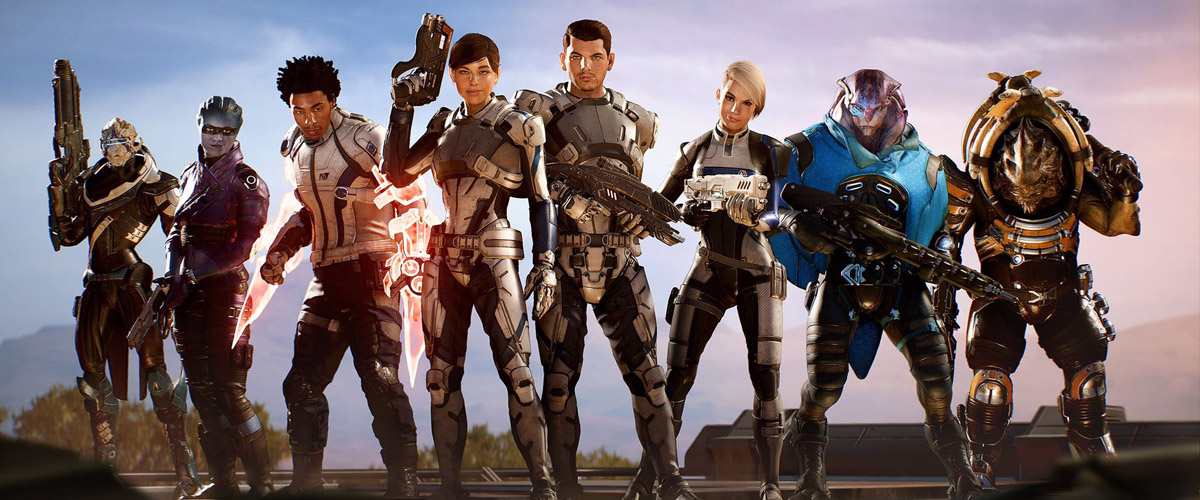Part One: Introduction
One year ago today, on 21-March, 2017, BioWare and Electronic Arts released Andromeda, the fourth major game in its popular and financially successful Mass Effect franchise.
The franchise boasted legions of fans, from the casual to the ravenous. The first three games had sold millions of copies, received reviews ranging from supportive to rapturous, and spawned countless ancillary products exploiting and expanding the storytelling universe, from coffee cups to comic books. The preview material for Andromeda made it seem like a significant narrative departure, but the look and feel were clearly of a piece with established Mass Effect canon, and on release day, the fanbase was feverish with anticipation.
One year later, the fanbase is in tatters. The casual fans regard the brand, and Andromeda specifically, as a joke, while the hardcore fans have retreated and shrunk into small, sequestered enclaves, defending their love for the franchise while feebly making excuses for Andromeda’s failure.
Because fail it did. Loudly, emphatically, inarguably, on all fronts: financial, critical, and popular.
Whether the perception is fair or not, Andromeda is seen as the game so bad that it didn’t just crash and burn on its own, it took the entire franchise with it, leaving Mass Effect as a whole teetering on the edge of death. Electronic Arts closed outright one of BioWare’s locations, laying off hundreds of people and repurposing the handful of surviving employees to other projects, and put Mass Effect in cold storage for the foreseeable future. BioWare still has titles in active development, but it’s moved on, with its next release being a multi-player action title called Anthem.
In the wake of Andromeda’s high-profile failure, a number of post-mortem investigations were published, revealing a dysfunctional studio, a chaotic development process, and an overbearing parent company grinding its subordinate’s gears on the project with demands about schedule and content strategy. The general picture that emerges is of a game without clear direction until late in the process, by which point they were too far behind to do anything but throw together what they could in order to meet the release date. And the consequence, famously, was a spectacularly botched release, and a game so undercooked and undertested, with an avalanche of defects, that it verged on being unplayable.
BioWare worked around the clock, releasing patch after patch to bring the game’s problems under control, but by August it was too late; the onslaught of bad publicity, and a fanbase bordering on open revolt, led Electronic Arts to pull the plug. There would be no further patches, came the announcement, and furthermore, there would be, for the first time in many years for a BioWare release, no downloadable content to expand the game’s world and story. Not only was Andromeda dead, but there would be no serious contemplation of further entries in the franchise until further notice. It was a disaster on a scale rarely seen in the world of AAA games.
So: Was Andromeda, really, that bad?
The vast majority of the writing about Andromeda’s failure has, understandably, focused on the mismanagement and bungling that led to the game’s catastrophic release, and the relentless negativity around the game for its first several weeks of life. There has, however, been very little analysis of the game strictly from a creative standpoint, examining its narrative foundation, its storytelling choices and structure, looking at whether the game itself, aside from its initial broken release, actually works. And that’s what I will be doing in this essay: performing a creative autopsy on Andromeda, now in its complete, functional, and fully-patched (or as fully as it will ever be) edition.
My intent? To show that even without the disastrously defective release, even if BioWare had given us a perfectly-polished bug-free game on day one, Mass Effect Andromeda would still have been a significant disappointment.
This will not be a rehashing of the same old superficial complaints about the game. There will be no smug mockery of oddly written dialogue about tired faces, or bellyaching about limited character-customization options, or kvetching about a Mako clone that doesn’t even have a gun, or grumbling about games-as-a-service with key content spread across paid DLCs, and the like; there won’t be any speculation about internal politics at EA and BioWare or the supposed quality of the development group assigned to the project. No, this will be an exhaustive deep-tissue analysis of the game’s foundation purely as a game, showing that from very early on in the conceptual process, fundamental creative mistakes were made from which the title would and could never recover. A year after the game’s release, when the title is cold and tempers have calmed and the storm has passed, we now have the distance to examine the game objectively, simply for what it is.
And it should go without saying that there will be significant spoilers in this discussion.
First, though…








